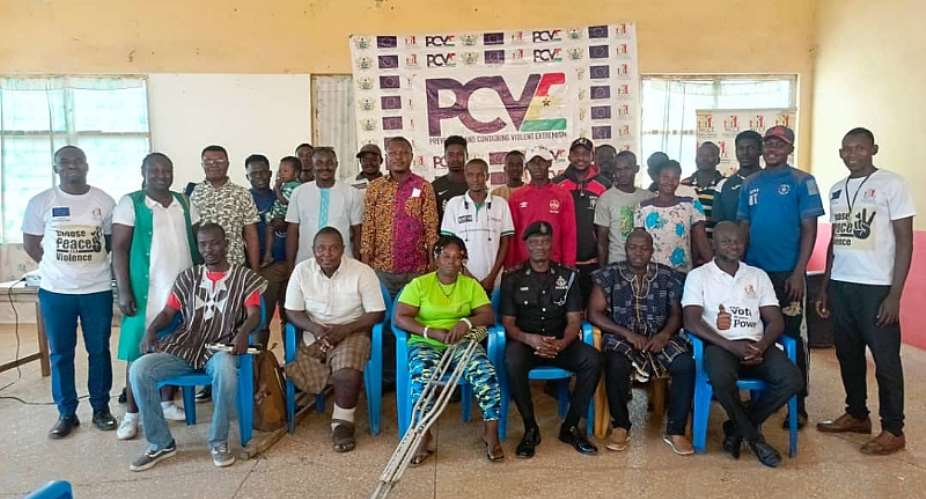In light of Ghana's upcoming 2024 general elections, the role of youth in promoting peace has taken center stage, emphasizing their potential to shape a peaceful and democratic future.
With youth comprising 38.2% of Ghana’s population, their involvement in fostering unity and preventing violence is more crucial than ever.
The Azenero Social Center in Sandema was abuzz on Monday, November 18, 2024, as youth leaders from political parties and civic organizations gathered for an impactful forum hosted by the National Commission for Civic Education (NCCE).
The event, themed “Political Party Youth Activist engagement on Preventing and Containing Violent Extremism (PCVE) in Ghana,” served as a rallying point for equipping the youth with the tools and knowledge to uphold peace ahead of the 2024 elections.
Organized with support from the European Union (EU), the forum reflected a nationwide commitment to combating violent extremism, a growing threat to Ghana’s social fabric. Addressing participants, Mr. Jeffery Adda, Municipal Director of NCCE Builsa North, described the youth as both vulnerable to radicalization and pivotal to fostering national unity.
“Violent extremism thrives on disillusionment and identity crises,” Mr. Adda remarked. “But by empowering young people with awareness, inclusivity, and patriotism, we can transform this challenge into an opportunity for peace.”
Insights from the Program
The program featured presentations from peacebuilding and law enforcement experts, including Mr. Angaamba David of the Upper East Peace Council and ASP Tabiri Joseph, the Municipal Assistant Police Commander. Discussions revolved around strategies to ensure peaceful elections, the signs of radicalization, and countering misinformation, a recurring theme in today’s digital landscape.
According to the National Peace Council, the youth’s involvement in peacebuilding is pivotal. Past electoral processes in Ghana, though democratic, have not been without sporadic violence, often placing young people at the heart of these incidents—whether as perpetrators or peace advocates. With unemployment and disillusionment among the youth on the rise, the stakes are high. “For many young people, the future is not a promise but a shadow,” a recent council report noted, highlighting the link between youth unemployment and the lure of violent extremism.
Pre-Election Efforts
Ahead of the elections, youth groups are being encouraged to lead peace campaigns and leverage social media to counter misinformation and promote tolerance. Community dialogues, involving youth leaders, religious figures, and other stakeholders, are also seen as critical in addressing grievances and building consensus among diverse groups.
On Election Day
During the elections, young people can act as peace ambassadors, ensuring calmness and transparency. By taking up roles as election monitors and reporting any irregularities, the youth can contribute significantly to the credibility of the electoral process.
Beyond the Ballot
The post-election period is equally crucial for peacebuilding. Youth initiatives such as reconciliation dialogues and workshops can help communities heal and foster unity, ensuring that divisions caused by the elections do not linger. "Education, dignified livelihoods, and access to decision-making platforms will ensure young people continue to champion peace," the council emphasized.
ASP Tabiri highlighted election rules, urging participants to avoid intimidation, vote buying, and spreading false information. He warned against vigilante practices, noting, “Top politicians practice peaceful democracy, but supporters often resort to violence. Let’s break that cycle.”
Grassroots Engagement
Participants included youth leaders from political parties such as the New Patriotic Party (NPP), National Democratic Congress (NDC), New Force Movement (NFM), Movement for Change (MFC), People’s National Convention (PNC), and other organizations such as the National Peace Council and Persons with Disabilities (PWDs). It also hosted representatives from community groups such as Kobdema, Balansa, Kalijiisa and the Fulani population. Focus group discussions allowed these diverse voices to share insights on crime prevention, social cohesion, and effective methods for identifying fake news.
Building a Culture of Peace
Mr. Adda’s closing remarks reinforced the forum’s mission: mobilizing the youth as Ambassadors for Peace. “This initiative isn’t just about elections. It’s about creating a society where unity and tolerance are foundational values,” he said.
Acknowledging the EU’s continued support, Mr. Adda called on political, religious, and traditional leaders to champion messages of peace in their campaigns and sermons. He also urged communities to rely on indigenous mechanisms for conflict resolution, ensuring inclusivity in governance and strengthening Ghana’s democracy.
A Call to Action
This engagement exemplifies the collaborative effort needed to address violent extremism and radicalization in Ghana. With youth at the forefront, initiatives like this are crucial in safeguarding the nation’s future, fostering social cohesion, and building resilience against forces that threaten peace.
Peace: modernghana

_
Follow us on our social media pages for more stories and posts from the NCCE.
https://www.instagram.com/nccegh/
https://www.facebook.com/nccegh/


Leave a comment